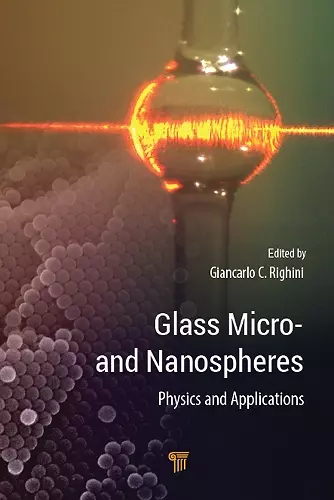Glass Micro- and Nanospheres
Physics and Applications
Format:Hardback
Publisher:Pan Stanford Publishing Pte Ltd
Published:28th Aug '19
Currently unavailable, and unfortunately no date known when it will be back

This book summarizes the recent research and development in the field of glass micro- and nanospheres. With special focus on the physics of spherical whispering-gallery mode resonators, it presents selected examples of application of glass microspheres in biosensing, laser devices, and microwave engineering. Hollow microspheres also offer a perspective for hydrogen transport and storage. On the other hand, glass nanospheres are fundamental for a class of photonic crystals (e.g., direct and inverse opals), as well as for industrial composite materials. Both micro- and nanospheres find important applications in biomedicine. The book highlights examples of preparation techniques and applications, addresses recent challenges, and examines potential solutions. It addresses physicists, chemists, materials scientists, and engineers, working with glass materials on microcavities, on nanotechnologies, and on their applications.
"The editor and his collaborating authors have written a state-of-the-art reference on micro- and nanospheres with applications in physics. This useful book should be of interest to graduate students in physics, optics and biomedical engineering as well as researchers involved with nanotechnology.
Beyond an introduction to whispering-gallery modes (WGMs), which are necessary for light coupling in glass microspheres as optical resonators, the reader can easily progress to applications in high-resolution biosensing for detecting molecules, viruses and biomarkers. Application-oriented readers will also benefit from a chapter on optical WGM micro-resonators applied to microwaves and millimeter waves, as well as from sections on energy applications of glass microspheres that address hydrogen storage and targets for nuclear fusion.
Additional topics include optical frequency conversion in microspheres, like third-order sum–frequency generation and chemical synthesis of dielectric nanospheres, such as gold silica nanospheres for artificial opals as well as coatings for sensing applications. Furthermore, the development of microsphere lasers, glass beads and ball lenses should attract a wide readership." - Axel Mainzer Koenig, CEO, Mainzer Koenig Research Associates, USA.
"Editor/author Righini (emer., Institute of Applied Physics, Florence) provides historical context for development of glass micro- and nanospheres in his brief introduction, followed by detailed and current overviews of their applications, presented in eight chapters, each coauthored with a different research group. Chapters cover theoretical concepts and a wide range of applications. These include technologies as common as glass beads for signals and road marking, and as “high tech” as whispering-gallery mode resonators or sensors for biomarker detection. This is not a “teaching” textbook, but it will be useful to the advanced scientist in any of the specific areas covered. Each chapter provides its own reference section, while the common index allows readers to quickly locate information about a specific topic throughout the book. Overall the text is well written and the print quality is high. However, a number of graphs, pictures, and subscripts in equations are far too small, and one can barely read the details shown. Several graphs could be improved through use of color to distinguish particular lines or sets of data points. The text is rich in formulas and equations. Unfortunately, none of the chapters provides a general index of abbreviations, and while most symbols are self-explanatory, some are simply not explained." - H. Giesche, Alfred University, USA
ISBN: 9789814774635
Dimensions: unknown
Weight: 708g
362 pages